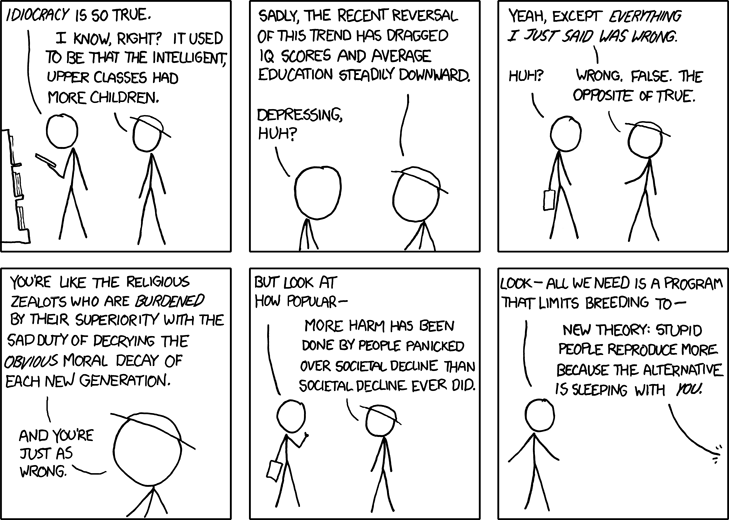Whence Iran?
Andrew Sullivan writes that the revolution it's not over. In fact, it's just beginning.
Andrew Sullivan writes that the revolution it's not over. In fact, it's just beginning.
This video will give you a good idea of the power of tornadoes.
Why did the U.S. invade Iraq? Nothing floated by the Bu$h administration made any sense. All of Bush's reasons have long been shot down. Now we learn of an April 2001 report, "Strategic Policy Challenges for the 21st Century," prepared by the James A. Baker Institute for Public Policy at the request of then-Vice President Dick Cheney. Truthout discusses the report and the historical context:
Two years before the invasion of Iraq, oil executives and foreign policy advisers told the Bush administration that the United States would remain "a prisoner of its energy dilemma" as long as Saddam Hussein was in power.I'm not suggesting that an oil grab was a legitimate reason to invade. I'm merely suggesting that it was the real (and unadmitted) reason for Bu$h to invade.
That's why you're on the internet, cruising the interblargosphere. You're looking for things to read that you might not necessarily agree with but which spark your interest because you're always on the lookout for a new take or new point of view on something. It might even be something you already have a definite opinion on, but you read on because you like reading things that make you think regardless of whether you agree with them. You're all about soaking up as many differing viewpoints as you can, but you've no interest in entering a comment-battle so if you do object, you do so in silence (possible but unlikely). You may be looking for things to read that you already know you agree with and very little else (more likely). You may even be looking for things to read that not only contradict you but flat-out piss you off in order to inspire you to write a post for the blog you've been neglecting (if you have a blog, that's almost a given). I'll admit I’m one who trawls for material to inspire my personal outrage, vicious condemnation and inordinately long & verbose sentences, but it’s not a new addition to my activity budget. Long before the internet I was fond of writing essays, treatises, critiques, manifestos, poems (gah!) or comic strips about things which annoyed or intrigued me, or into which I'd put an inordinate amount of idle thought. They were many & varied: a convoluted comparison between the dangers of running red lights at a pedestrian crossing on my BMX with doing the same in a car; a detailed essay on the specific mechanisms of “clown evil” and the macro-karmic reasons for their hideousness; my pseudo-Freudian theories on why some men spend inordinate lengths of time reading in the toilet, delaying every other resident not currently using a colostomy bag and glorying in their own pungent stench; a series of unnecessarily graphic limericks featuring my best friend, a busty wench and zombies. Before 1994 and my first experience with electronic mail I'd fax (yes, fax), post or hand these missives to my friends and see what reactions I'd get. They ranged from “meh” to humouring me, the occasional laugh, occasional indignant defensiveness and – more often than not – sideways looks and quiet voicings of concern for my mental stability (especially when my letters were illustrated). I didn't know it then, but with my unsolicited opinionated ranting, arguments for or against things noone was actually discussing in the real world and blatant & ridiculous attention-seeking behaviour, I was in Gilbert & Sullivan’s parlance the very model of a modern major pain the arse. In today’s terms: a blogger. So, no, it’s not a new thing for me and certainly not a new phenomenon for humanity either, this public sharing of opinion with people who don’t care. Celebrated Protestant Original Gangster, Martin Luther, is famous for publicly posting his disagreements . . .
I know it is wholly unoriginal of me to link to the comic XKCD, but today's strip was just too true to life:
 Almost nothing annoys me more than the bemoaning of the future as an immoral, uneducated, unenlightened time. Many people- of both conservative and liberal ideologies- call up sunny images of a past where people were happier, smarter and "better". Usually we can point to political and technological advancements that demonstrate this is not the case.
My deeply-held belief is that the future is bright and brimming with promise, that today's youth are not hopeless or devolved, and that new fangled technology will not cause the collapse of our species. When bad things arise, we are tempted to look to the past with a fond and foggy nostalgia- as if fundamental human problems were not always the same. Bringing apocalyptic rhetoric into the discussion of modern problems is inappropriate, I think, because every generation has its big, scary troubles. As this comic advises, we should always look to the evidence and not catastrophize.
Almost nothing annoys me more than the bemoaning of the future as an immoral, uneducated, unenlightened time. Many people- of both conservative and liberal ideologies- call up sunny images of a past where people were happier, smarter and "better". Usually we can point to political and technological advancements that demonstrate this is not the case.
My deeply-held belief is that the future is bright and brimming with promise, that today's youth are not hopeless or devolved, and that new fangled technology will not cause the collapse of our species. When bad things arise, we are tempted to look to the past with a fond and foggy nostalgia- as if fundamental human problems were not always the same. Bringing apocalyptic rhetoric into the discussion of modern problems is inappropriate, I think, because every generation has its big, scary troubles. As this comic advises, we should always look to the evidence and not catastrophize.